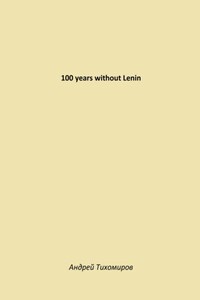The formation of Lenin as a revolutionary
Lenin (Ulyanov) was born in Simbirsk (Ulyanovsk) in the family of an inspector of public schools, who received hereditary nobility. Lenin's elder brother was executed (1887) for his participation in the assassination attempt on Tsar Alexander III. In the same year, Lenin entered the law faculty of Kazan University; in December, he was expelled from the university and expelled for participating in the student movement. In 1891, he passed the exams for the Faculty of Law at St. Petersburg University; assistant attorney at Law in Samara. In 1893 he moved to St. Petersburg. In 1895 He participated in the creation of the St. Petersburg "Union of Struggle for the Liberation of the Working Class", then was arrested. In 1897, he was exiled for 3 years to the village of Shushenskoye in the Yenisei province. In 1900, he went abroad; together with G. V. Plekhanov and other revolutionaries, he began publishing the newspaper Iskra. At the 2nd Congress of the RSDLP (1903) he headed the Bolshevik Party. Since 1905 in St. Petersburg; since December 1907 in exile. In April 1917, having arrived in Petrograd, he put forward in the April Theses a course for the victory of the socialist revolution. After the July crisis of 1917, he was in an illegal position. He headed the leadership of the October Uprising in Petrograd. At the 2nd All-Russian Congress of Soviets, he was elected Chairman of the Council of People's Commissars (SNK), at the same time (since 1918) Chairman of the Council of Workers' and Peasants' Defense; member of the All-Russian Central Executive Committee (VTSIK) and the Central Executive Committee of the USSR. He played a decisive role in the conclusion of the Brest Peace.On August 30, 1918, he was seriously wounded in an attempt on his life. In 1922, he became seriously ill and did not participate in political activities.
Lenin considered the creation of a party of professional revolutionaries, a "new type of party", to be the most important means of revolutionary struggle, unlike parliamentary social democratic parties, rejecting the concepts of E. Bernstein and K. Kautsky as reformist and revisionist, he concluded that capitalism had entered the last stage of its development – imperialism and the advanced countries of Europe were ripe for world socialist revolutions. Sharply criticizing the principles of parliamentary democracy and separation of powers, he defended the course of establishing the dictatorship of the proletariat as a tool for building socialism and communism. The dictator of the proletariat, in Marxism, is the designation of the power that is established as a result of the revolution carried out by the working class, led by its party.










